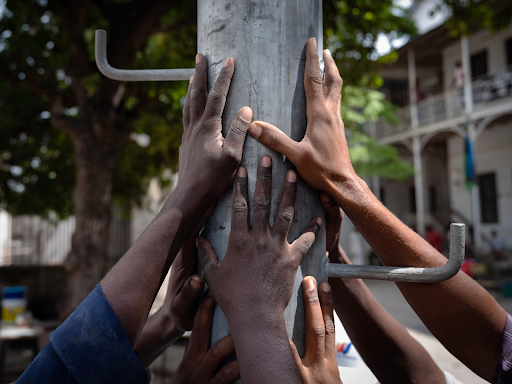
In 1948, the United Nations (UN) passed the Universal Declaration of Human Rights, a text that would become a benchmark and point of reference for society for decades to come. Fast forward to 2022, and amendments such as the right to clean water have since been added, yet access to the internet still remains to be declared a basic human right.
Scholars like Merten Reglitz, a lecturer in Global Ethics at the University of Birmingham and author of a paper on the matter, believe that this needs to change, arguing that internet access is itself a moral human right and that everyone across the world should have unmonitored and uncensored access to this global medium.
In a conversation with Equal Times, the academic explains how access to healthcare in developing countries is one of the rights that can now be accessed thanks to technology. "For some people, especially in developing countries, access to the internet has facilitated access to health services, where otherwise there would be none at all," says Reglitz.
The pandemic, he says, has shown that internet access is also crucial in more economically stable countries. "Even in the most developed countries, during the lockdowns, without access to the internet, we were not really able to exercise many of our freedoms, such as freedom of expression, freedom of association or the right to information."
Like Reglitz, World Mobile is passionate about equal access to the internet. Their innovative hybrid blockchain-based mobile network aims to connect those that traditional networks have forgotten. Currently rolling out its technology across Africa and the US, the company strives to provide subscribers access to the internet in an affordable, fair, and sustainable manner, especially in evolving countries like those in Africa.
World Mobile's self-governed and decentralized technology will allow users to affordably connect to the world around them without jeopardizing their privacy. Unlike traditional telecommunications companies, World Mobile does not rely on the sales of personal data to make up for operational costs. Instead, subscribers will own their data and have a digital identity so they can access services they were previously excluded from; like banking, insurance, borrowing, and saving.
Intelligent incentives
The telecommunications industry has several significant flaws that result in inefficiency. First, the costs of running and expanding traditional networks are so high that they cannot reach rural areas to bridge the digital divide. Secondly, the technology used is not dynamic and cannot be easily adjusted to efficiently deliver connectivity to areas with differing rollout challenges. Finally, the traditional model means expanding telecom companies generally resort to selling consumer data to make up for the massive operational costs.
World Mobile Token's sharing economy was designed with several challenges in mind. Firstly, the decentralized network means World Mobile doesn't have to rely on selling user information to expand the network. Instead, the sharing economy and rewards are enough to keep the network growing through the community.
In order to encourage participants to grow the network and provide coverage in remote areas, each AirNode operator is rewarded with a share of the network's revenue for delivering connectivity to others, allowing them to own a part of the World Mobile network and earn for everyone that connects through their AirNode.
Bridging connectivity
Through its shared economy model, World Mobile aims to deliver network infrastructure that will improve network design and operational efficiencies while providing a fluid delivery of connectivity to network users. The use of blockchain in this model removes the intermediaries and a layer of cost from the delivery mechanism.
The network also has the ability to rapidly expand thanks to the sharing economy and blockchain technology, which allow the participants to have a provable and guaranteed rewards system. This solution addresses the affordability issue and the more efficient use of network resources to enable connectivity to be more distributed and decentralized.
Protecting privacy
Another issue World Mobile wishes to solve is the telecommunication industry's privacy problem. Many mobile operators are looking for ways to create new revenue streams, but by enhancing privacy, World Mobile aims to respect and protect people's fundamental online data rights.
By utilising blockchain in its technology stack, the platform ensures privacy is a fundamental feature for its users. Furthermore, user data is also protected through public/private key infrastructure, as metadata will be secured in distributed nodes throughout the network, allowing synchronization between the different devices owned by the user.
The world is waking up to the reality that internet access and connectivity are basic human rights. Thanks to the emergence of blockchain technology and platforms like World Mobile, which are pioneering a way forward for developing nations across the globe, slowly but surely, access to the internet will no longer be a luxury but a basic necessity without barriers.









